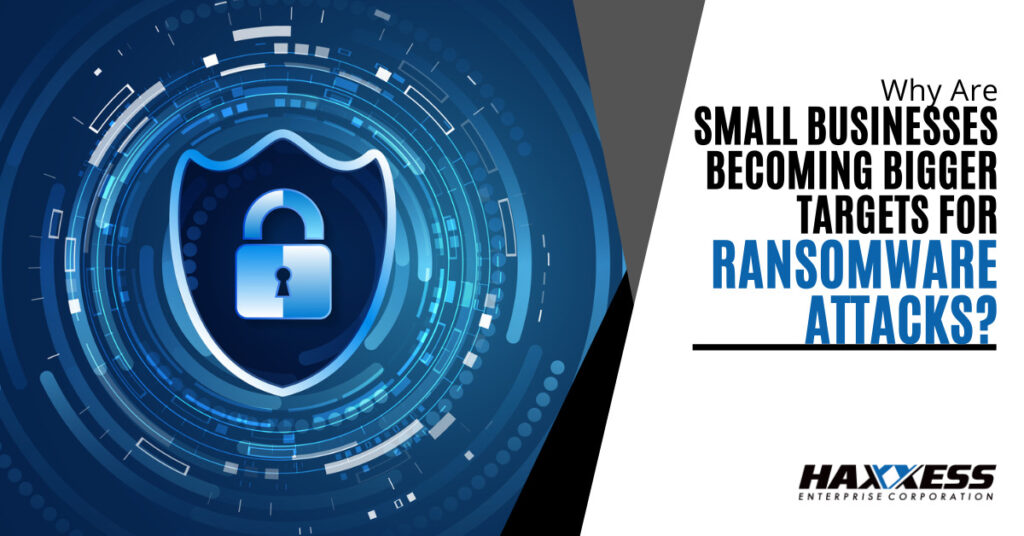
How many small businesses contract managed IT services companies to handle their network security? Maybe a few business owners, but not as many as should. After all, it is commonly believed that cybercriminals are less interested in small businesses!
While ransomware attacks on larger corporations are usually reported in the news, small businesses are not immune. In fact, in recent times, these attacks seem to be directed specifically at small businesses. Although attacks on small companies look like a rare occurrence, they aren’t- they just don’t make the headlines.
A new study shows that many small and medium-sized businesses (SMBs) admitted that their security structure had many vulnerability issues. It is even more surprising to know that 48% of leaders at small businesses struggle with data protection, and 20% attest to having no disaster recovery solution as a backup plan.
What is more worrisome is the fact that cybercriminals carry out these attacks on small businesses because they realize that they can go undetected for a long time. Unfortunately, this fuels their drive and gives them more reason to attack SMBs.
Every business, regardless of size, must implement appropriate cybersecurity measures to tackle ransomware attacks. Still, the best defense for small businesses, in particular, is to accept the fact that hackers are looking out for vulnerabilities in the system to exploit.
Small businesses should be concerned about ransomware attacks because no company is exempted. Let’s find out how small businesses are becoming bigger targets for ransomware attacks.
Ransomware is a tactic used by cybercriminals to gain entry into your system. It is easily activated when an employee clicks on a link in a phishing mail. As soon as the connection is activated, it affects the network and computer systems of the business.
This attack can also affect the business systems or computers through security holes even when no one plays a part. New versions of Microsoft Windows are not left out of these attacks, especially when security patches aren’t being installed regularly.
Scammers use different types of ransomware attacks to affect their victims. Most times, the hacker will require that the business owner makes some payment to restore files or access the information on the computer. But, when they successfully gain access to the system, the business computer will display a message directly from the hackers.
Sometimes, the hacker even threatens to expose the files if the ransom is not paid as when due. If the business owner cannot pay the ransom as the hacker has requested, the hacker will threaten to publish the business’s data.
Hackers are constantly targeting small businesses because they are often carefree about enforcing security measures. Because of the size of their operations, many small businesses quickly conclude that their data is invaluable to hackers.
Unfortunately, this is not true as small businesses are typically seen as easy targets considering they do not always have the budget to implement cybersecurity best practices.
More prominent businesses have the financial resources to protect their security walls. Cybercriminals realize this and settle for small companies to pave the way for attacks on more giant corporations.
Large companies often contract some of their jobs to small businesses, such as marketing, call center activities, and more. To make the work easier, larger companies connect SMBs to their IT system using electronic means. This prompts the hackers to look in the direction of small businesses. They realized that if they could penetrate the IT system of small businesses, they could easily break the defense of larger enterprises.
When hit with a ransomware attack small businesses are often vulnerable because they don’t have a full backup copy of their data that can be restored easily or quickly. In the meantime, their operations are down and they’re losing money.
Cybercriminals feed on the weaknesses of small businesses knowing that many will pay the ransom if it’s affordable (several thousands of dollars versus millions). Thus, a good number of companies pay the ransom to get back up and running, which further fuels the attackers to target more SMBs.
A ransomware attack is disastrous to small businesses because it may cripple all operational activities. In some cases, the business clients may become displeased with the service disruption and decide to take their business activities elsewhere.
Asides from the damage it causes to the small business, the business owners will often also have the cost of the ransom. Even when the small business may have an alternative backup, the attack will still cost the small business time and money to get the company up and running again. Most times, small businesses do not have the resources to cater to such expenses.
Protecting your small business is critical. The only way to do this is by establishing cybersecurity measures that protect your business’s interest.
Let’s help you protect your network from attacks affordably. Contact us at (705) 222 8324 for effective strategies.